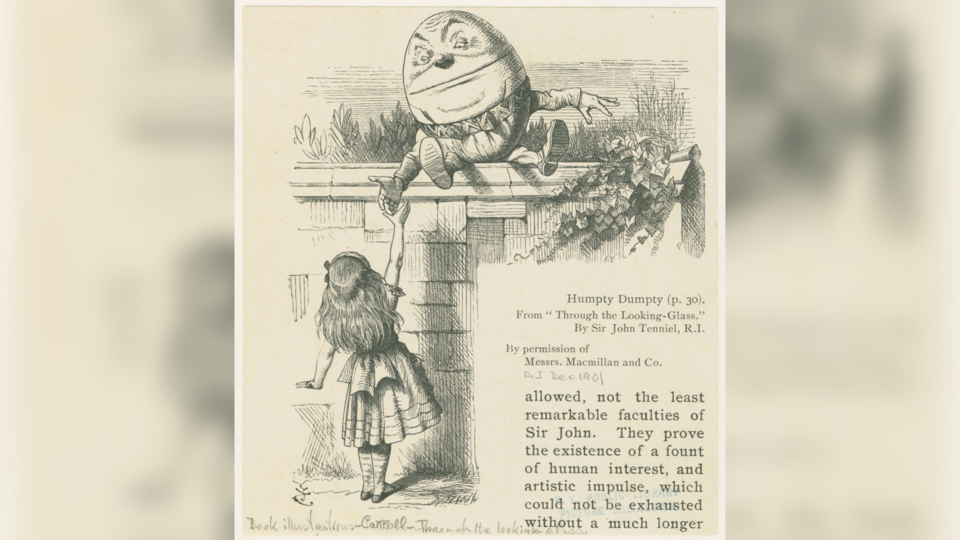You needn’t be a logophile (lover of words) to have noticed that newly formed words are popping up at a rapid clip – think of "shrinkflation" and "skimpflation."
It’s a trend that started in the 19th century, 1872 to be precise, and the person responsible was Lewis Carroll. In chapter six of Alice Through the Looking Glass, Alice asks Humpty Dumpty to tell her the meaning of the poem “Jabberwocky”. After she has repeated the first verse, Humpty Dumpty stops her and explains: "'Brillig' means four o’clock in the afternoon – the time when you begin broiling things for dinner."
"That’ll do very well," said Alice, "and 'slithy'?"
"Well, 'slithy' means 'lithe and slimy.' 'Lithe' is the same as 'active.' You see it’s like a portmanteau – there are two meanings packed up into one word."
Portmanteau has stuck as the term for such combined words. Originally, however, portmanteau signified something entirely different. In the 1540s it identified the officer at a royal French court who carried the prince’s mantle. By the 1580s it had been extended to refer to a leather case or bag, which could be carried on horseback. Later, the typical portmanteau was a valise hinged at the back so that it opened like a book.
The Oxford English Dictionary states that Lewis Carroll used portmanteau in the sense of “that into which things are packed together,” applying it “to a factitious word made up of the blended sounds of two distinct words and combining the meaning of both.” Subsequently, portmanteau was “extended to things that are or suggest a combination of two different things of the same kind."
Such “a combination of two different things of the same kind” is well illustrated by a few of the earliest portmanteau words to be recorded: "brunch," combining breakfast and lunch, coined by Guy Beringer in 1895; "smog," a combination of smoke and fog, which appeared in the Journal of the American Medical Association on Aug. 26, 1905; and "motel," coined in 1925 by the Milestone Interstate Corporation for the motor hotel.
Fast forward to 1957 and we arrive at an event that unleashed countless portmanteaus. On Oct. 4, 1957 the Soviet Union launched a man-made satellite into orbit around the Earth, calling it Sputnik. A second satellite called Sputnik 2 was launched on Nov. 3, 1957. When it became known that a dog was aboard Sputnik 2, the satellite was dubbed "Muttnik." The U.S. launched a rival satellite on Dec. 6, 1957 – Vanguard 1A rose three feet off its pad before it crashed down, exploding in flames. To the North American press it became a "kaputnik," a "dudnik," a "flopnik" and a "stayputnik." The spread of portmanteau words ending in "-nik" (also a Yiddish suffix) seemed unstoppable. It was so easy and tempting to stick "-nik" on to the end of any word, and people probably did it for fun and for the private diversion of friends and family. Some words circulated more widely and had a long life – I remember "beatnik" and "peacenik" in particular.
Recently, many portmanteau words have come to life in reaction to stressful or controversial situations. I mentioned "shrinkflation," "skimpflation" and "greedflation," all 21st century terms, in a Richmond News column. In December 2010, in its list of the words of the year, the New York Times included "mansplainer" (“a man compelled to explain or give an opinion about everything – especially to a woman”). The Guardian mentioned in an article of June 5, 2024 that Trump “has spoken at various points of pursuing his political opponents through the courts – a tactic the Republicans have termed as 'lawfare'."
Of course, not all recent portmanteaus are laden with such negativity. One that I came across a few weeks ago is "newtro," which blends the words new and retro and refers to the revival of analogue media. And I introduced one in March of this year in my column about old wives’ tales – "mythtake," a portmanteau of myth and mistake.
Sabine Eiche is a local writer and art historian with a PhD from Princeton University. She is passionately involved in preserving the environment and protecting nature. Her columns deal with a broad range of topics and often include the history (etymology) of words in order to shed extra light on the subject.



